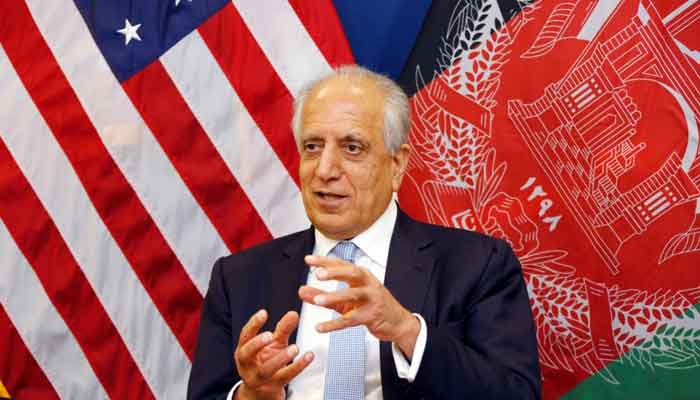US, Taliban agree on framework for peace deal: Khalilzad
The peace negotiations in Doha, Qatar, had previously been described on Saturday by Khalilzad as "more productive than they have been in the past," signaling the first significant shift in the geopolitical stalemate in years. But he added that "nothing is agreed until everything is agreed."
KABUL: The US and Taliban officials have agreed in principle to a framework that could eventually bring the long-running Afghan war to an end, the US Special Representative for Afghanistan Zalmay Khalilzad said on Monday.
In comments given to the New York Times and confirmed to CNN by the US Embassy in Kabul, Zalmay Khalilzad said the framework for peace would see the Taliban vow to prevent the country from being used as a hub for terrorism in return for a US military withdrawal.
“We have a draft of the framework that has to be fleshed out before it becomes an agreement,” Khalilzad told the Times. “The Taliban have committed, to our satisfaction, to do what is necessary that would prevent Afghanistan from ever becoming a platform for international terrorist groups or individuals.”
The peace negotiations in Doha, Qatar, had previously been described on Saturday by Khalilzad as "more productive than they have been in the past," signaling the first significant shift in the geopolitical stalemate in years. But he added that "nothing is agreed until everything is agreed."
In a tweet on Monday, Khalilzad said he had briefed Ghani on the “progress we have made” in Doha. “Peace is America’s highest priority in Afghanistan, a goal we believe all Afghans share,” he added. Talks between the two sides are expected to resume next month.
The sides are working on a ceasefire that would lead to a sequenced agreement for dialogue, initially between the US and Taliban and then between the Taliban and Afghan government, a source with knowledge of the talks told the CNN last week.
An Afghan source close to the negotiations told CNN on Monday that while a ceasefire and US withdrawal were both discussed, neither side came to final conclusions. The source said the Taliban will not agree to a ceasefire without the US committing to a full troop withdrawal, but the Americans want any withdrawal to be conditional on the ceasefire holding.
The Taliban are skeptical that the US will actually pull out if the ceasefire holds. The source added that the US wouldn't announce any plans for a troop withdrawal without the Taliban entering into discussions with the Afghan government.
Acting Secretary of Defense Patrick Shanahan told reporters Monday that the US talks with the Taliban were "encouraging," but when asked if he had been "tasked to be prepared for a full withdrawal," he replied, "I have not."
Meanwhile, in an address to the Afghan people responding to the talk of a breakthrough, Ghani recalled his country had struck deals with the Taliban before only to see the terms violated. “We want peace quickly, we want it soon, but we want it with prudence,” he said.
“Prudence is important so we do not repeat past mistakes.” "I call on the Taliban to... show their Afghan will, and accept Afghans' demand for peace, and enter serious talks with the Afghan government," Ghani said in a nationally televised address from the presidential palace in Kabul.
"We want peace, we want it fast but we want it with a plan," Ghani said. "We should not forget that the victims of this war are Afghans and the peace process should also be Afghan-led... No Afghan wants foreign troops to remain in their country indefinitely. No Afghan wants to face suicide attacks in hospitals, schools, the mosques, and parks."
-
 Meghan Markle, Prince Harry Friends Suggest Their Marriage 'isn't All It Seems'
Meghan Markle, Prince Harry Friends Suggest Their Marriage 'isn't All It Seems' -
 Andrew Handed Out 'classified' Information To Jeffrey Epstein
Andrew Handed Out 'classified' Information To Jeffrey Epstein -
 Margot Robbie Recalls Wild Party Days And Getting Kicked Out Of Clubs
Margot Robbie Recalls Wild Party Days And Getting Kicked Out Of Clubs -
 NASA's Hubble Space Telescope Discovers ‘Dracula Disk', 40 Times Bigger Than Solar System
NASA's Hubble Space Telescope Discovers ‘Dracula Disk', 40 Times Bigger Than Solar System -
 Annular Solar Eclipse 2026: Where And How To Watch ‘ring Of Fire’
Annular Solar Eclipse 2026: Where And How To Watch ‘ring Of Fire’ -
 Zayn Malik Explains Past Comments About Not Being In Love With Gigi Hadid
Zayn Malik Explains Past Comments About Not Being In Love With Gigi Hadid -
 Internet Reacts To 10 Days Flight Ban Over El Paso
Internet Reacts To 10 Days Flight Ban Over El Paso -
 YouTube Music Tests AI-powered ‘Your Week’ Recap To Summarise Listening Habits
YouTube Music Tests AI-powered ‘Your Week’ Recap To Summarise Listening Habits -
 Kelly Clarkson Ready To Date After Talk Show Exit?
Kelly Clarkson Ready To Date After Talk Show Exit? -
 Is AI Heading Into Dangerous Territory? Experts Warn Of Alarming New Trends
Is AI Heading Into Dangerous Territory? Experts Warn Of Alarming New Trends -
 Google Updates Search Tools To Simplify Removal Of Non-consensual Explicit Images
Google Updates Search Tools To Simplify Removal Of Non-consensual Explicit Images -
 Chilling Details Emerge On Jeffrey Epstein’s Parties: Satanic Rights Were Held & People Died In Rough Intimacy
Chilling Details Emerge On Jeffrey Epstein’s Parties: Satanic Rights Were Held & People Died In Rough Intimacy -
 50 Cent Gets Standing Ovation From Eminem In New 'award Video'
50 Cent Gets Standing Ovation From Eminem In New 'award Video' -
 Bad Bunny Delivers Sharp Message To Authorities In Super Bowl Halftime Show
Bad Bunny Delivers Sharp Message To Authorities In Super Bowl Halftime Show -
 Prince William 'worst Nightmare' Becomes Reality
Prince William 'worst Nightmare' Becomes Reality -
 Thai School Shooting: Gunman Opened Fire At School In Southern Thailand Holding Teachers, Students Hostage
Thai School Shooting: Gunman Opened Fire At School In Southern Thailand Holding Teachers, Students Hostage




